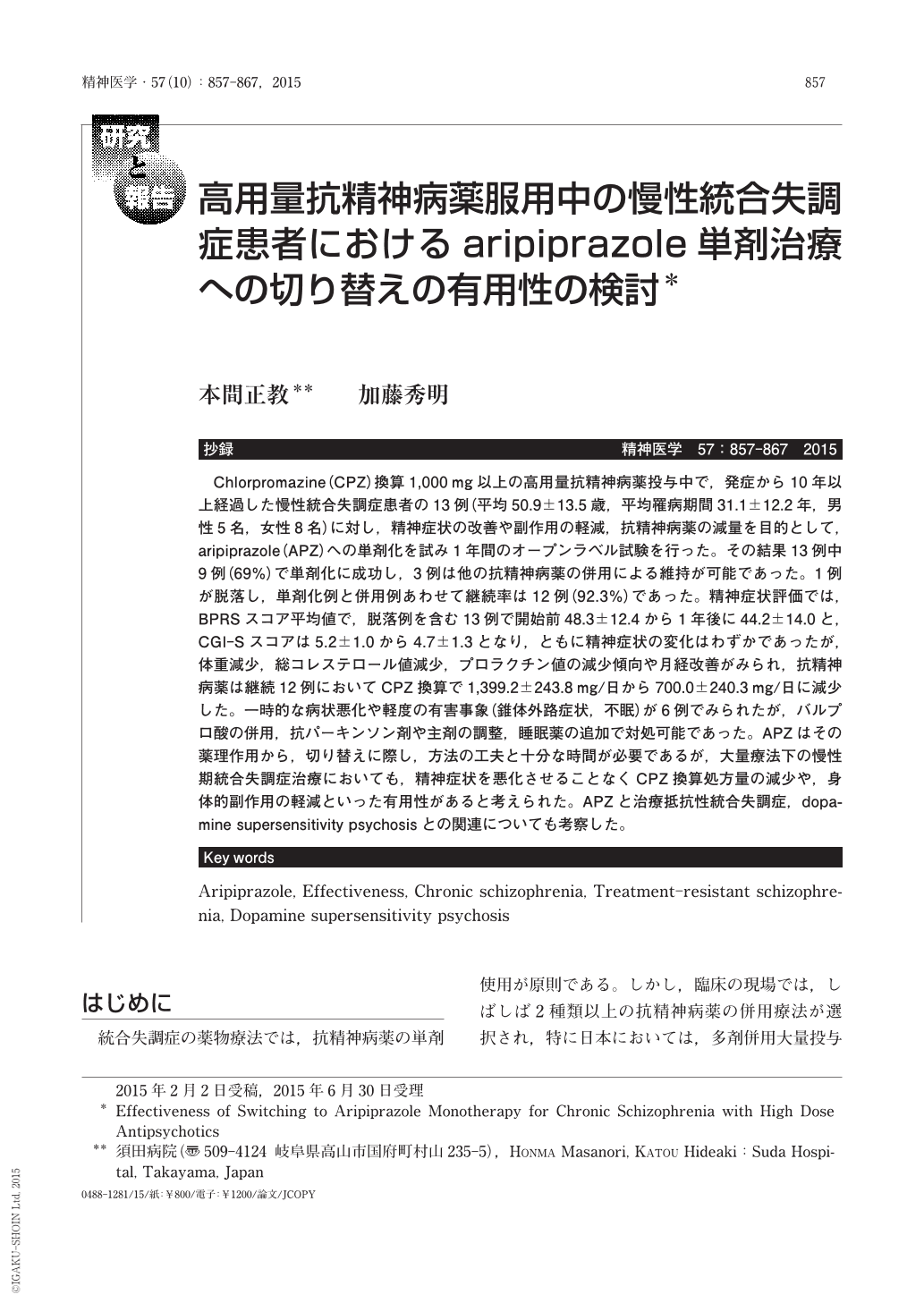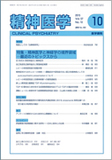Japanese
English
- 有料閲覧
- Abstract 文献概要
- 1ページ目 Look Inside
- 参考文献 Reference
抄録
Chlorpromazine(CPZ)換算1,000mg以上の高用量抗精神病薬投与中で,発症から10年以上経過した慢性統合失調症患者の13例(平均50.9±13.5歳,平均罹病期間31.1±12.2年,男性5名,女性8名)に対し,精神症状の改善や副作用の軽減,抗精神病薬の減量を目的として,aripiprazole(APZ)への単剤化を試み1年間のオープンラベル試験を行った。その結果13例中9例(69%)で単剤化に成功し,3例は他の抗精神病薬の併用による維持が可能であった。1例が脱落し,単剤化例と併用例あわせて継続率は12例(92.3%)であった。精神症状評価では,BPRSスコア平均値で,脱落例を含む13例で開始前48.3±12.4から1年後に44.2±14.0と,CGI-Sスコアは5.2±1.0から4.7±1.3となり,ともに精神症状の変化はわずかであったが,体重減少,総コレステロール値減少,プロラクチン値の減少傾向や月経改善がみられ,抗精神病薬は継続12例においてCPZ換算で1,399.2±243.8mg/日から700.0±240.3mg/日に減少した。一時的な病状悪化や軽度の有害事象(錐体外路症状,不眠)が6例でみられたが,バルプロ酸の併用,抗パーキンソン剤や主剤の調整,睡眠薬の追加で対処可能であった。APZはその薬理作用から,切り替えに際し,方法の工夫と十分な時間が必要であるが,大量療法下の慢性期統合失調症治療においても,精神症状を悪化させることなくCPZ換算処方量の減少や,身体的副作用の軽減といった有用性があると考えられた。APZと治療抵抗性統合失調症,dopamine supersensitivity psychosisとの関連についても考察した。
Aripiprazole (APZ) is a non-sedative atypical antipsychotic agent with a few side effects and acts as a dopamine D2 partial agonist. There have been no reports of switching to APZ monotherapy for chronic schizophrenia. In this report, we examined 13 cases of patients with chronic schizophreni a (mean age 50.9±13.5 years old;5 men, 8 women), who were treated with a high dose (equivalent of over 1,000mg dose of chlorpromazine) of antipsychotic drugs, which was switched to APZ. The results indicated that 9 of the 13 cases (69%) made a successful switch to APZ monotherapy after 1 year, while three needed the previous antipsychotics, and one had to stop APZ monotherapy due to continuous worsening of positive symptoms. In all the 13 cases, the Brief Psychiatric Rating Scale (BPRS) indicated mild change from 48.3±12.4 to 44.2±14.0 (mean±SD). In the 12 continuing cases (92.3%), 7 cases showed mild improvement of the Clinical Global Impression of Severity (CGI-S), but 5 cases showed no change. The mean dosage of antipsychotics decreased from 1,399.2±243.8 (mg/day) to 700.0±240.3 (mg/day) of chlorpromazine equivalents in the 12 cases. Furthermore, decrease in body weight, decrease in serum total cholesterol, improvement of hyperprolactinemia, and menstrual disorder were observed. We could resolve the transient disease progression and mild adverse events (extrapyramidal symptom, insomnia) by using sodium valproate, lorazepam, sleep inducing drugs, and by dose regulation of main agent. Although contrivance and enough time of switching are needed, this report suggests that switching to APZ has useful advantages in chronic schizophrenia. We considered the relationship between APZ, treatment-resistant schizophrenia, and dopamine supersensitivity psychosis in discussion.

Copyright © 2015, Igaku-Shoin Ltd. All rights reserved.


